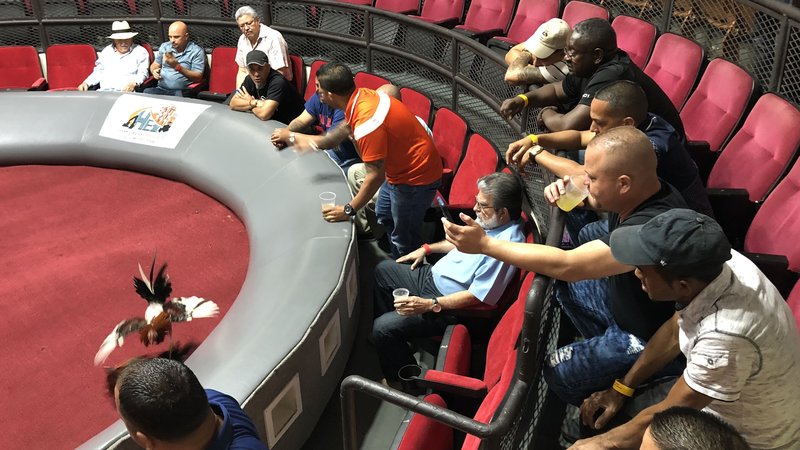SAN JUAN — Thursday was a somber day at the Cockfighting Club of San Juan.
The rows and rows of cubbies that usually house up to 80 roosters waiting to fight were mostly empty. On this day, only 26 birds were on display.
Miguel Ortiz, a regular at the club since it opened in 1954, said a lot of people had stayed home, depressed.
“It’s because of the law that passed in the Congress,” he said.
If signed by President Trump, the U.S. Farm Bill will make cockfighting illegal in all U.S. territories, including Puerto Rico. The ban’s inclusion in the bill, which passed in Congress Wednesday, had been long-sought by animal rights activists in the mainland U.S.. But in Puerto Rico, news of its passage dropped like a bombshell.
The island’s governor, Ricardo Rosselló, had scrambled to Washington D.C. to lobby against it. But by the time he landed Wednesday, the bill had already been approved. Under the law, the ban would take effect in a year.
Cockfighting is a centuries-old tradition in Puerto Rico, dating to the early days of the Spanish colony. The island is just a hundred miles long but has nearly 80 cockfighting clubs, which are regulated by Puerto Rico’s central government.
Officials say the industry accounts for $18 million in economic activity and provides jobs to nearly 30,000 people. Speaking on the House floor before the bill was passed, Puerto Rico’s non-voting member of Congress, Jenniffer González-Colón, said the ban would be a further blow to Puerto Rico’s already devastated economy.
Miguel Ortiz has been fighting gamecocks since he was six years old. He said a lot of people had stayed home Thursday, depressed about the impending ban.
“We are approving another federal regulation on the island without even consulting the people of Puerto Rico,” she said. González-Colón and many other officials on the island said the ban was an example of U.S. colonialism, and an attack on an integral part of Puerto Rican culture and society.
But the ban’s proponents say cockfighting is cruel.
“Cruelty is not culture,” said Kitty Block, acting president of the Humane Society of the United States, one of the main proponents for the ban. “These are birds that are armed with weapons that slash eyes out, and it’s just a brutal blood sport and it’s really something that should’ve gone a long time ago.”
Block said that while there is virtually no support for the ban among Puerto Rico’s elected officials, a poll her organization conducted of 1,000 registered voters in Puerto Rico found that more supported a ban than opposed it, and only about a third had ever attended a cockfight.
At the San Juan Cockfighting Club, many in attendance Thursday were furious over the impending ban, but also seemed resigned that it appeared headed for President Trump’s signature.
“We’re devastated,” said Josean Rivera, who raises roosters, charging their owners $5 per week per bird. “We don’t know what to do. We weren’t prepared for this. This is how I feed my family.”
He predicted that thousands of families will be driven into poverty, and that the industry will go underground, making it more dangerous for attendees and for the birds themselves. Like many supporters of cockfighting on the island, Rivera rejects the argument that it’s a cruel sport, saying the roosters are raised well and are rarely allowed to fight to the death.
Rivera also wondered what’s going to happen to all the roosters currently being raised across the island. The president of the San Juan Cockfighting Club, Miguel Ortiz, Jr., estimated there may be up to a million of them.
If federal agents raid farms and confiscate them, they’ll likely kill them, Rivera predicted, “because they can’t set them free. If they set them free, they’ll kill each other.”
–NPR

